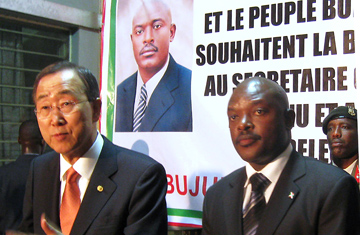
U.N. chief Ban Ki-moon (left) talks to the media as Burundian President Pierre Nkurunziza stands by
When Burundi goes to the polls on June 28, it will be the first of four countries in the East African Community (EAC) to hold presidential elections over the next eight months. Neighboring leaders and international observers were hoping the war-torn country would set a positive precedent for the others in the EAC — an intergovernmental organization intended to create political and economic link between countries that include Rwanda, Uganda, Kenya, and Tanzania — and complete its transition to democracy in the process. But in recent weeks, an escalating series of political clashes and violent incidents has made it unlikely that Burundi will serve as a role model for the region.
The trouble began on May 24 when voters in the country's local elections handed power to the ruling National Council for the Defense of Democracy-Forces for the Defense of Democracy (CNDD-FDD). Accusing the CNDD-FDD of fraud, the 13 opposition parties withdrew from the presidential race, leaving incumbent Pierre Nkurunziza as the only candidate.
Since then the government has banned all political rallies on the grounds that they will threaten national stability. Authorities are also using that same defense in their threats to arrest opposition leaders. On June 12, four grenade blasts shook the capital, injuring seven people, including a child. Police blamed opposition parties for the violence, but party leaders denied involvement. Four days later there were reports that police had gone to arrest Agathon Rwasa, chairman of the opposition Forces for National Liberation, only to be faced with a group of supporters refusing to let them get near his house. (A police spokesman has denied the reports as "rumor.") Meanwhile, some two dozen CNDD-FDD offices have been torched around the country.
"Burundi is facing a serious crisis," says Fabien Nsengimana, program coordinator of the Burundi Leadership Training Program. And it could endanger not only national but regional stability. Glancing at Burundi's vital statistics, it's hard to imagine that what goes on in the country could have such an impact — Burundi is landlocked, it's one of Africa's smallest countries and one of the world's poorest, with little in the way of prized natural resources. Yet time and again the former Belgian colony has proved pivotal to east Africa's security, serving as a crossroads for the illegal arms trade and a floodgate for refugees. It even played a part in the 1994 Rwandan genocide, with strife between Hutus and Tutsis in Burundi igniting tensions across the border.
EAC security chiefs have been holding meetings in the capitals of the member countries to discuss building a framework that would allow for cross-border military intervention if a member state slips into crisis. Beatrice Kiraso, EAC Deputy Secretary General in charge of Political Federation, has said that "instability in one country means instability for others. We should not allow this as it will undermine our integration efforts." Those efforts, the EAC hopes, will turn it into the European Union of east Africa, with all of the members cooperating on monetary, security, legislative and judicial issues.
"If large-scale violence erupts in Burundi, it is likely that the Democratic Republic of Congo (DRC), Tanzania and Rwanda will immediately pay the price," says Louis-Marie Nindorera, Burundi country director for Global Rights, an international human rights capacity-building organization. "The first consequence [will probably be] massive displacements across borders. Massive displacements will surely unsettle the areas where refugees regroup because they tend to immediately get involved in local power games" which could spill over into neighboring Rwanda and DRC.
United Nations Executive Representative for Burundi Charles Petrie has said that the country's crisis can only be solved through dialogue. But for now neither side appears willing to budge. Opposition parties are demanding a recount of the results of the local elections, and insist they will not participate in the upcoming presidential elections unless new officials are added to the independent election commission, which they believe includes too many CNDD-FDD supporters. The CNDD-FDD refuses to meet the demands, and accuses the opposition parties of inciting unrest. Meanwhile, some observers suspect that the opposition's claim that the elections were rigged is insincere — otherwise, they say, the parties would have filed legal proceedings — and that the main motive is to galvanize support by creating the impression that the ruling CNDD-FDD is undermining democracy.
Burundi is no stranger to political strife, but traditionally it would cut along racial lines, with Hutus pitted against Tutsis. But a 2001 power-sharing agreement has effectively rendered race a non-issue. Today, four of President Nkurunziza's 12 ministers, including his vice president, are Tutsi. These days, unrest is fed by social inequality: undereducated and unskilled youth, high unemployment, and a scarcity of land in a country where the majority of people survive as subsistent farmers.
Since his election in 2005, Nkurunziza has implemented free primary school education and free health care to pregnant mothers and children under five. But a shortage of resources, including qualified doctors and teachers, has hindered the reform process. Corruption has reportedly worsened during Nkurunziza's first term. Burundi could benefit from the EAC's plans to adopt a common market, some analysts say. But first, the country needs to resolve an election impasse that threatens the entire region.
